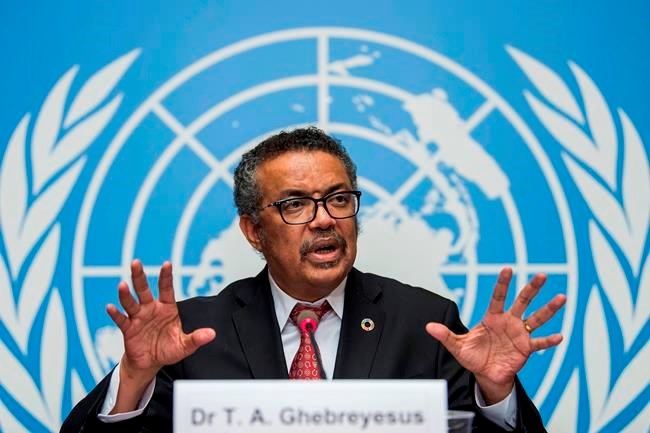TORONTO — Canada deserves praise for its efforts to fight COVID-19 both at home and abroad as well as for its commitment to public health, the head of the World Health Organization said on Tuesday.
In a speech to the Empire Club of Canada, Dr. Tedros Adhanom Ghebreyesus, director-general of the WHO, cited among other things, Ottawa’s $440-million donation to the organization's anti-pandemic initiative.
“This pandemic has reminded us of the importance of multilateralism, something that Canadians have always embraced,” Tedros said. "Canada has treated this pandemic seriously and adopted an approach that many other countries regard as an example."
Tedros warned of the challenges ahead, noting the recent steep spike in cases and deaths both in Canada and around the world. To date, COVID-19 has struck more than 54 million people, 1.3 million fatally. Last week alone saw a record four million new cases and 60,000 deaths reported to the organization.
"We might be tired of COVID-19 but it's not tired of us," Tedros said. "The virus has no ideology or beliefs; its only goal is to spread."
Countries and scientists around the world have been working to develop new diagnostics and treatments for the novel coronavirus. In addition, the race to develop a vaccine has produced promising results.
Tedros said more than $4 billion is still urgently needed to sustain momentum in the international effort. He also warned the global distribution of any vaccine will be among the most daunting logistical efforts the world has seen since the Second World War.
The main issue, he said, will be to ensure limited supplies are distributed fairly.
"The best way to do that is by vaccinating some people in all countries rather than all people in some countries," he said.
At the same time, Tedros warned that a vaccine in and of itself won't be a panacea. Public health measures, such as social distancing and avoiding poorly ventilated indoor spaces, will have to continue.
Also, an effective vaccine — about 200 are in the works — won’t fix fundamental issues of inequality, both within and among countries, he said.
“There is no vaccine for poverty, hunger, inequality or climate change.”
In separate comments, the WHO's Dr. Kate O'Brien said health-care workers must be the first to get a vaccine when it becomes available. They are, she said, at high risk of contracting COVID-19 but essential for maintaining health services.
“We don’t simply want to move from one crisis to another crisis,” said O'Brien, a Canadian and the organization's director of its department of immunization, vaccines and biologicals.
O'Brien urged people to get their information from credible sources and to avoid the flood of misinformation on social media about the virus, and, more specifically, about a potential vaccine.
It's particularly important to address safety questions, she said, especially given the lightning speed with which scientists are developing a vaccine to fight COVID-19.
The unprecedented speed is partly the product of the global science community's focus on vaccine development as well as huge strides made in medical technology. For example, she said, it took years just to identify the virus that can lead to AIDS, never mind sequence its genes.
“That needs to be communicated to people in the community,” O'Brien said.
This report by The Canadian Press was first published Nov. 17, 2020.
Colin Perkel, The Canadian Press




